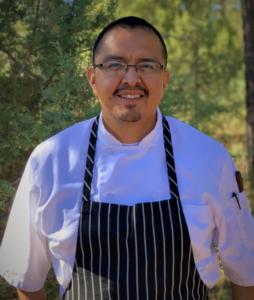Indigenous chef Nephi Craig to deliver presentation at 2nd Annual Anishinbek Nation Diabetes Conference

By Rick Garrick
CHIPPEWAS OF RAMA FIRST NATION — Indigenous chef Nephi Craig looks forward to speaking about Indigenous Foods for Health: Trauma, Violence, and Sugar at the 2nd Annual Anishinabek Nation Diabetes Conference, Embracing Diabetes with Knowledge and Care scheduled on March 6-7 at Casino Rama in Chippewas of Rama First Nation.
“My work is unique as an executive chef in that I have kind of a dual role as an executive chef and a clinician,” Craig says. “As a behavioural health technician and certified relapse prevention specialist, I work in mental health and we operate a cafe, Café Gozhóó, on the White Mountain Apache Tribe. We provide clinical services, we have prevention, vocational training in culinary arts and hospitality, and we work with clients in recovery on a regular basis.”
Craig says his path as an executive chef led him to his role, adding that he is also a person in recovery with 12 years of sobriety.
“We integrate Indigenous foods as an access to learning, reconnection and emotional, spiritual and physical well-being,” Craig says. “I’ve traveled internationally throughout my career; as a younger chef, I cooked in London, Germany, Japan, Brazil, Mexico, and Canada on various projects all centering around Indigenous food and food ways. I’ve been doing this work 26 years this year and it’s something that I couldn’t have scripted — it’s an amazing opportunity to be able to do what I do. I combine all of the experiences of being a professional chef and also the clinical tools to provide services to people in recovery, just like myself.”
Craig says his presentation is a broad overview but also an in-depth look at health disparities across Indigenous communities.
“It’s very much place-based, but it’s also relevant to the international scale of the Indigenous experience,” Craig says. “It presents colonialism as a health disparity and challenges practitioners to utilize traditional ecological knowledge in their efforts to reach community members and tackle whatever health disparity they might be up against, whether it’s diabetes, obesity, heart disease, suicidality, addiction, incarceration, a number of the common health disparities we face as Indigenous peoples.”
Craig says Indigenous food ways provide an integrated care modality that needs to be drawn out by place-based practitioners.
“I hope that my presentation can kind of illuminate some of those tools so that clinicians, community members, parents, and young people can leverage their Indigenous experience for health and wellness,” Craig says. “It’s a broad examination that’s historical but also very contemporary and frames it as a solution-based approach to public health.”
Craig says his work was recently featured in Gather, a documentary film that won a James Beard Award in 2022 for Documentary/Docuseries Visual Media.
“It’s on food sovereignty in the United States,” Craig says. “I’m one of five characters in that film and it documents the journey to open Café Gozhóó, and it mentions other areas of Native America within the United States.”
Craig was also the recipient of an honourary PhD in Visual Arts: Philosophy, Aesthetics and Art Theory from the Institute of Doctoral Studies in the Visual Arts. He was also recently a nominee for the James Beard Foundation’s award for Best Chef: Southwest.
The conference will also feature presentations by Nicole Redvers and Marc Hébert. Redvers, associate professor and director of Indigenous Planetary Health at the Schulich School of Medicine and Dentistry at Western University, is scheduled to speak about Bridging Indigenous Medicine Systems with Western Systems. And Marc Hébert, lead of Indigenous community health at Ontario Renal Network, division of Ontario Health, and Mallika Patil, senior specialist on Indigenous Kidney Health at Ontario Renal Network, division of Ontario Health, will share a presentation on Working Together to Improve Kidney Care.
The deadline to register for the conference is February 23. Registration is limited to frontline workers who provide care to Indigenous persons with diabetes. To register, please contact Julie Harris, Diabetes Navigator at Anishinabek Nation: julie.harris@anishinabek.ca.

